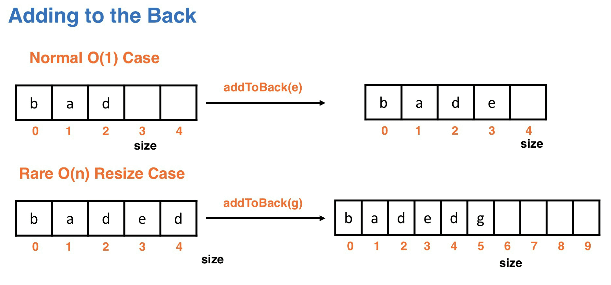arraylists introduction
ArrayList is a dynamic, ADT data structure.
Abstract data types (ADT)
This is a model description of a data type that is defined by the type's behaviors and operations. This is similar to a Java interface, where there are operations (methods) that can be utilized, but the implementation is abstract.
An example of the List ADT:
addAtIndex(int index, T data)adds an item to the listremoveAtIndex(int index)removes an item from the listget(int index)returns dataisEmpty()returns whether the list is emptyclear()resets the list configuraiton with no datasize()returns the number of data currently stored in the list
The List ADT is comprised of different variations of ArrayLists and LinkedLists.
ArrayLists
- a type of
Listbacked by an array - Each of Java's ArrayLists will have to store the object, for primitives this requires an object wrapper
Example in Java:
// ArrayList in Java is from package `java.util`
// The data type must be an `Object`
// generic typing is implied from the declaration statement
ArrayList<String> list = new ArrayList<>();
Dynamic allocation
- an arraylist is an abstraction / a wrapper for an array
- these are resized automatically by the implementation without users knowing
- this is dynamically allocated memory because the array is reallocated and copied when more space is necessary
- the resizing is still considered O(n) because it is using an array as an underlying component
- resizing is still a limitation because of the array structure
Arraylist terminology
- the size of the data structure is the # of non-null pieces of data being stored in it
- this is typically stored in a variable
- the capacity of an arraylist is the # of data that can be stored
Ex ArrayList:
// This has a size = 5
// and a capacity = 8
[a][b][c][d][e][][][]
Arraylist requirements
- data must be contiguous
- there cannot be null spaces between the data
- data must be zero-aligned (must start at index 0)
- for efficient operations the size should be stored
- the index size gives us access to the next empty spot in O(1) time
Ex ArrayList:
// data is not contiguous
[b][a][][d][][][][]
// data is contiguous but not zero-aligned
[][b][c][d][][][][]
// properly done
// size = 5
[a][b][c][d][e][][][]
Adding to an arraylist
- we can add to the back in O(1) if resizing is not needed
- this is due to knowing the size ahead of time
- adding to the back of an arraylist and doing a resize is considered worst-case
- once the capacity is exceeded we are facing a cost of O(n)
- the cost of adding is "pessimistic" because the resize step is considered rare
- amortized analysis states that looking at the cost over timer ather than the cost per add operation
- this implies that adding to the back will still be O(1) if we used amortized analysis
- because we are just repetitively adding to the back during resize, it would be repetitive single operations "n" times
// normal O(1) case
// addToBack(f)
// size 5 -> size 6
[a][b][c][d][e][][][] -> [a][b][c][d][e][f][][]
// rare O(n) resize case
// this requires a resize and each of the data pieces
// must be copied over
// addToBack(f)
// size 5 -> size 6
[a][b][c][d][e] -> [a][b][c][d][e][f][][][][]
Adding elsewhere
- adding at an arbitrary index is not the "back", it is O(n)
- we have to add at a position then copy each of the index values to their new positions
- all data must be shifted, which would then open the cell to insert the data
// addAtIndex(1, f)
// all data must be shifted 1 cell at a time
[a][b][c][d][e][] -> [a][f][b][c][d][e]
Remove operations
- removing from the back is O(1)
- removing from an arbitrary index not at the back is O(n) due to data shifting
// removeAtIndex(0)
// all data must be shifted 1 cell at a time
// down 1 index
[a][b][c][d][e][] -> [f][b][c][d][e][]


